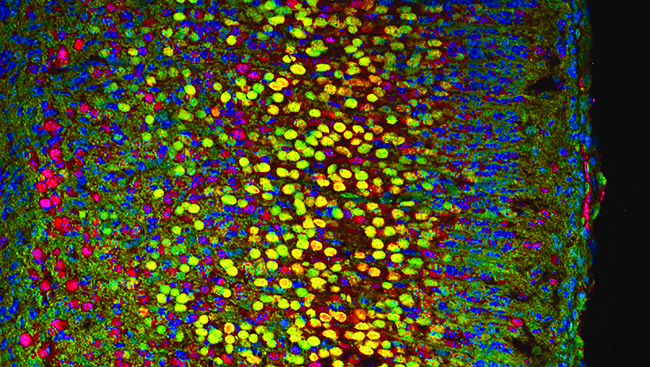Module 8A: Caveats for Designing and Interpreting Optogenetics Approaches
In this presentation, faculty cover some of the major caveats to optogenetics experiments, at the conceptual and technical level. Specifically:
- Stephan Lammel discusses the importance of careful methodological considerations for interpreting the results of optogenetic experiments.
- Karel Svoboda highlights some of the many potential unexpected effects of optogenetics perturbation in the context of neural circuit dynamics and behavior.
- David Kupferschmidt shares how diverse forms of synaptic plasticity and complex neurochemistry can complicate our ability to infer direct “causation” from optogenetics experiments.
After watching this presentation, you should be able to:
- Understand and control for potential confounds of optogenetics manipulations that involve non-cell-type-specific expression of opsins, toxicity, tissue heating, and scattered light delivery.
- Understand how to turn potential unexpected effects of optogenetics manipulation to your advantage using neurophysiological characterization of the system response optogenetics perturbation.
- Understand and minimize the potential confounds of synaptic plasticity and complex neurochemistry in the interpretation of optogenetics experiments.
Visit the Community forum for all eight modules to share your insights and best practices, ask questions, and engage with other training series’ participants.
Speakers

Stephan Lammel, PhD
Stephan Lammel is an assistant professor in the department of molecular and cell biology and the Helen Wills Neuroscience Institute at the University of California, Berkeley. His research focuses on understanding how brain circuits that use the neurotransmitter dopamine contribute to different aspects of motivated behavior. He earned his PhD in neuroscience from Philipps-University in Marburg (Germany) and completed his postdoctoral training at Stanford University.

Karel Svoboda, PhD
Karel Svoboda is a senior group leader at HHMI’s Janelia Research Campus. Svoboda’s work is at the intersection of neuronal biophysics and cognition. A current focus is to identify core principles underlying information processing in cortical circuits and related structures in the context of planning and execution of voluntary movements. He is also developing new methods to interrogate neural function in intact brains. Previously, he was a principal investigator at Cold Spring Harbor Laboratories. Svoboda earned a PhD in biophysics from Harvard University and was a postdoctoral fellow at Bell Laboratories.

David Kupferschmidt, PhD
David Kupferschmidt is the staff scientist for the Integrative Neuroscience Section at NIH National Institutes of Neurological Disorders and Stroke. In collaboration with principal investigator Joshua Gordon, Kupferschmidt guides research into the neural circuit basis of working memory and its dysfunction in mouse models of genetic susceptibility to neuropsychiatric disease, particularly schizophrenia. He earned his PhD in psychology from the University of Toronto, studying the neurochemistry of stress and relapse to drug seeking. During his postdoctoral training at NIH National Institute on Alcohol Abuse and Alcoholism, Kupferschmidt combined neurophysiology with optical, viral, and transgenic tools to assess synaptic and circuit mechanisms of skill and habit learning.
4 of 5 articles left
Login
or
Become a Member
to unlock content





